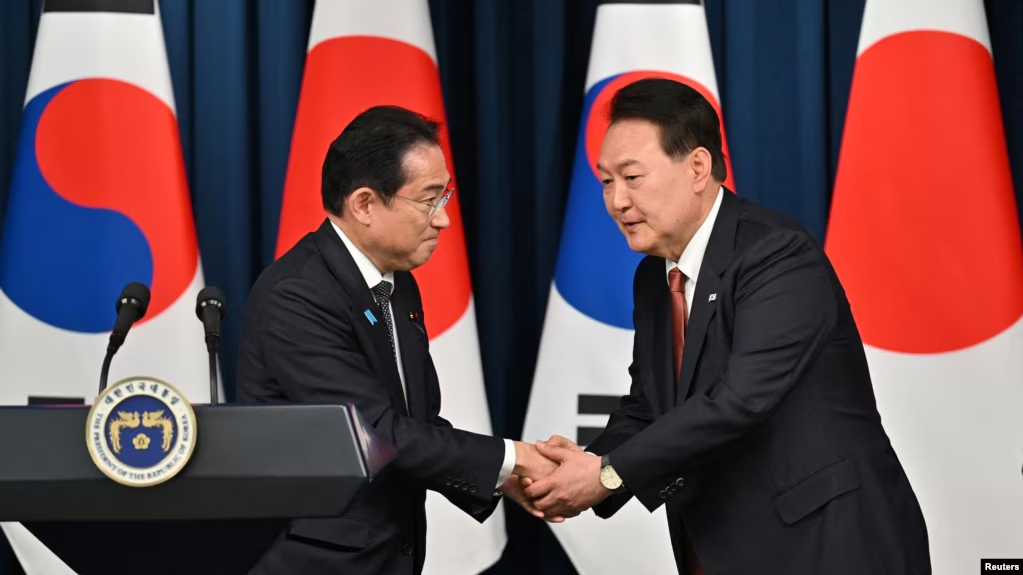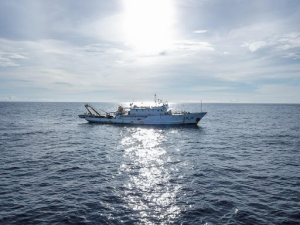Japanese Prime Minister Fumio Kishida and South Korean President Yun Seok-yul held telephone talks on Wednesday (April 17), where both sides reconfirmed that they will deepen Japan-South Korea bilateral, as well as U.S.-Japan-South Korea trilateral cooperation.

During his visit to Washington, D.C. on April 10, Fumio Kishida met with U.S. President Joe Biden to discuss reshaping the structure of the U.S. military in Japan, joint production of defense weaponry, joint missile defense systems, lunar exploration, artificial intelligence, intelligence sharing and other cooperation, as well as how to face the threat from China.
In order to share the results of his visit to the US, Fumio Kishida made a request to hold a telephone conversation with Yun Seok-yeol. According to Japan’s Kyodo news agency, in the phone call between the two sides, Fumio Kishida shared the results of his talks with Biden and the progress made in U.S.-Japan relations, and made it clear that he would continue to maintain friendly relations with South Korea. He also said that Japan and the U.S. will jointly promote cooperation with partner countries such as South Korea in order to promote stability in the Indo-Pacific region.
According to Yonhap News Agency, Yoon Seok-yue pointed out that against the backdrop of rising instability in the current international situation on the Korean Peninsula and in the Indo-Pacific region, South Korea and Japan should maintain close cooperation, and that the U.S., Japan, and South Korea will establish closer tripartite cooperation on North Korea in order to contribute to regional peace and common prosperity.
The leaders of Japan and South Korea have had frequent exchanges recently, with as many as seven talks last year, and both sides agreed in this call to continue to strengthen communication between the leaders and diplomatic departments this year.
Last week, during Fumio Kishida’s visit to the U.S., a strike group led by the aircraft carrier USS Theodore Roosevelt CVN-71 conducted a two-day joint exercise with the Japan Maritime Self-Defense Force (JMSDF) and the South Korean Navy (ROKN) in the disputed waters of the East China Sea.
The simultaneous U.S. military and diplomatic actions are reportedly intended to reinforce solidarity and collaboration between the U.S. and its allies in response to what they see as aggressive behavior by the Chinese military in the South and East China Seas.
South Korea has expressed cautious optimism that the U.S. and Japan plan to boost their alliance to enhance security in East Asia and the Indo-Pacific region. A South Korean foreign ministry spokesman recently told the Voice of America that it “noted” that the U.S. and Japan expressed “the defensive nature of the U.S.-Japan alliance” during their summit in Washington last week, emphasizing “peace and stability” in the region. “The spokesman said.
According to the spokesman, “South Korea, the U.S. and Japan are working to institutionalize the expansion of trilateral cooperation through last year’s Camp David agreement” to “strengthen the rule-based international order.”
At the first trilateral summit between the U.S., Japan and South Korea, which was held at Camp David outside the U.S. capital of Washington in August last year, the leaders of the three countries said in a joint statement that they “strongly oppose any attempts to unilaterally change the status quo in the Indo-Pacific waters,” promised to provide a joint response to crises in the region and focused on the security threats from China and North Korea. Threats from China and North Korea.
China at the time slammed the U.S. hosting of the U.S.-Japan-South Korea summit as Washington’s attempt to turn the Asia-Pacific region into “a battleground for geopolitical rivalry”.
The U.S. government is now believed to be coordinating with the Japanese and South Korean governments to hold another U.S.-Japan-South Korea leaders’ summit on the sidelines of the NATO summit in Washington in July this year to discuss how to jointly address the growing security threats from China and North Korea.

